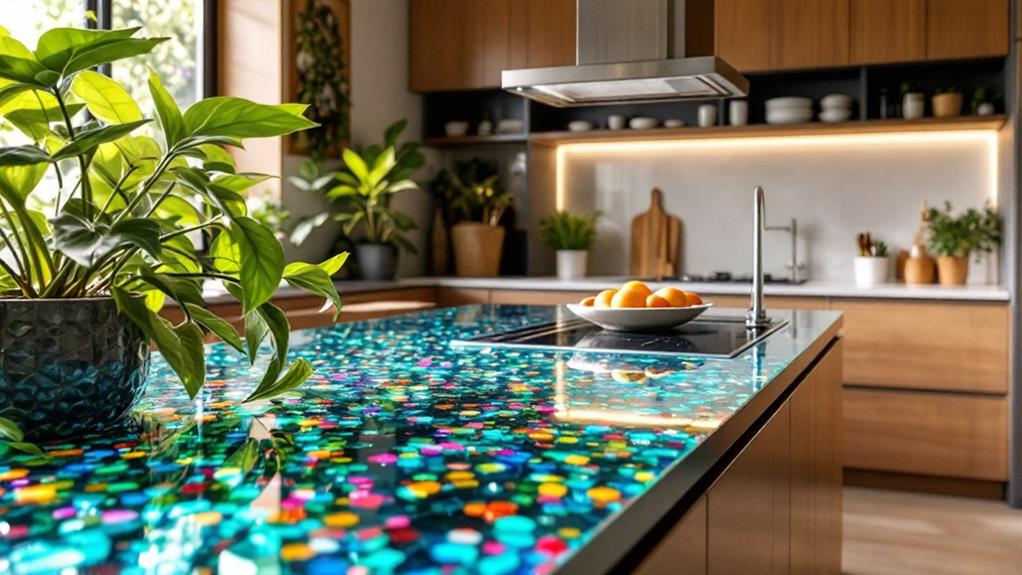
Recycled Glass Countertops: A Durable and Green Option
Recycled glass countertops are an excellent choice for those seeking durability and sustainability in their home design. Made from approximately 85% recycled materials, these countertops greatly reduce landfill waste and need for raw materials. They boast resilience against scratches, stains, and extreme temperatures, all while promoting hygiene with their non-porous nature. Customizable in color and texture, they cater to unique aesthetic preferences. The energy-efficient production process further enhances their eco-friendly appeal by conserving resources and reducing carbon emissions. Continue exploring to discover more about this harmonious blend of design and ecological responsibility.
Key Takeaways
- Composed of 85% recycled materials, recycled glass countertops significantly reduce landfill waste and support sustainability.
- They utilize 30% less energy during production compared to new glass, lowering the carbon footprint.
- Non-porous surfaces resist scratches, stains, and inhibit bacteria growth, ensuring durability and hygiene.
- Customizable colors and textures offer unique and personalized kitchen designs.
- Initial costs are higher, but durability and long-term savings make them a valuable investment.
Benefits of Recycled Glass
In the domain of sustainable home improvement, recycled glass countertops stand out for their remarkable environmental benefits. These surfaces are composed of approximately 85% recycled materials, greatly reducing landfill waste and conserving natural resources. Importantly, the production of recycled glass utilizes 30% less energy than creating new glass, contributing to a reduced carbon footprint.
This eco-friendly feature not only appeals to environmentally conscious homeowners but also enhances the aesthetic appeal of any space.
Recycled glass countertops offer a distinctive aesthetic appeal with customizable colors and textures, allowing homeowners to craft unique designs tailored to their preferences. This versatility makes them an attractive choice for those seeking to enhance their kitchen's visual appeal while maintaining a commitment to sustainability.
Moreover, the non-porous nature of recycled glass countertops provides outstanding resistance to scratches and stains, ensuring longevity and durability. Their hygiene benefits, such as inhibiting bacteria growth, add another layer of practicality and allure.
Investing in recycled glass countertops is not merely an eco-conscious choice; it also increases home value. As a premium option with eco-friendly features, these countertops attract environmentally-minded buyers, ensuring that sustainability and style go hand in hand in modern home design.
Environmental Impact
Recycled glass countertops offer a compelling solution for reducing landfill waste by utilizing post-consumer glass, effectively diverting thousands of tons of materials from disposal each year.
This sustainable material choice not only conserves natural resources by repurposing existing materials but also supports a circular economy aimed at minimizing waste.
Reducing Landfill Waste
A significant environmental advantage of recycled glass countertops lies in their ability to drastically reduce landfill waste. By utilizing post-consumer glass, these countertops play an essential role in landfill diversion, effectively preventing a substantial amount of glass from contributing to the growing waste crisis. This waste reduction is not only beneficial in minimizing the burden on landfills but also in decreasing the environmental footprint associated with waste disposal.
The process of creating recycled glass countertops repurposes existing materials, thereby reducing the need for new raw materials. This approach aligns with the principles of a circular economy, where waste is transformed into valuable resources.
Additionally, the production of recycled glass requires 30% less energy than manufacturing new glass, further reducing the environmental impact by conserving energy and lowering carbon emissions. For every ton of recycled glass produced, a significant reduction of over 1,000 pounds of CO2 emissions is achieved, underscoring its effectiveness in promoting sustainability.
Sustainable Material Choice
Glass countertops offer not only a solution to landfill waste but also exemplify a sustainable material choice with significant environmental benefits. By utilizing post-consumer glass, these countertops serve as eco friendly alternatives that dramatically reduce the environmental footprint of new glass production. This practice diverts substantial waste from landfills, transforming potential pollutants into valuable resources.
The environmental impact of recycled glass countertops is profound:
- Energy Efficiency: Manufacturing recycled glass countertops uses approximately 30% less energy compared to new glass, substantially reducing greenhouse gas emissions.
- Carbon Savings: Recycling glass can save over 1,000 pounds of CO2 emissions per ton, supporting cleaner air and mitigating climate change.
- Hygienic Design: Non-porous surfaces inhibit bacteria growth, promoting hygiene and safety in kitchen spaces.
- Sustainable Sourcing: The use of recycled materials supports sustainable manufacturing practices and aligns with the rising demand for eco-friendly home renovations.
These countertops are not just functional but also a representation of responsible consumption, making them an ideal choice for the environmentally conscious homeowner.
Durability Factors
When considering the durability factors of recycled glass countertops, one is immediately struck by their exceptional resistance to scratches and stains, which guarantees they retain a pristine appearance over time.
This scratch resistance guarantees that even in bustling kitchen environments, the countertops can withstand daily wear and tear, while stain resistance protects against spills and splashes, maintaining their elegant look.
The non-porous nature of recycled glass further enhances its durability by inhibiting bacteria growth, presenting a hygienic choice for eco-conscious homeowners.
Moreover, these countertops are engineered to tolerate extreme temperatures, making them impervious to damage from hot pots and pans.
This heat resistance underscores their capability to endure heavy kitchen use without compromising their structural integrity.
Notably, recycled glass countertops are celebrated for their longevity, often surpassing traditional materials like granite or quartz in lifespan.
Their ability to resist discoloration guarantees that their vibrant aesthetic remains intact, offering a visually appealing and sustainable solution for modern kitchens.
Maintenance Requirements
Recycled glass countertops offer an eco-friendly solution with their non-porous surfaces, which naturally inhibit bacteria growth and promote hygienic conditions.
Their easy-to-clean nature allows homeowners to maintain a pristine kitchen environment using standard household cleaners, reducing the need for harsh chemicals.
This combination of sustainability and convenience guarantees that recycled glass countertops are not only aesthetically pleasing but also practical and environmentally responsible.
Easy Cleaning Process
Many homeowners find the easy cleaning process of recycled glass countertops appealing due to their eco-friendly and hygienic nature.
These countertops boast a non-porous surface, a crucial aspect in countertop care, which discourages bacteria and stain penetration. Such attributes make cleaning techniques straightforward and sustainable. Routine cleaning requires no more than mild soap and water or standard household cleaners, ensuring an effortless maintenance regimen. This simplicity not only saves time but also aligns with eco-conscious living by reducing the need for harsh chemicals.
The durability of recycled glass countertops further enhances their appeal, as they resist scratches and heat, necessitating minimal upkeep. Unlike other countertop materials that may demand specialized cleaning products or techniques, recycled glass remains low-maintenance, ideal for busy households.
The surface's resilience to discoloration means deep cleaning is seldom required, preserving its aesthetic appeal effortlessly.
Choosing recycled glass countertops not only simplifies cleaning but also supports a sustainable lifestyle.
Consider the advantages:
- Eco-friendly maintenance: Mild cleaners preserve both the environment and your countertop.
- Effortless elegance: Maintain a pristine look without labor-intensive techniques.
- Time-saving: Quick cleaning fits seamlessly into a busy schedule.
- Long-lasting beauty: Enjoy a countertop that remains vibrant over time.
Such benefits make recycled glass countertops a compelling choice for the environmentally conscious home.
Bacteria Growth Inhibition
A notable advantage of recycled glass countertops lies in their innate ability to inhibit bacteria growth, a feature that sets them apart in both hygiene and eco-conscious design.
These countertops are non-porous, a characteristic that considerably enhances bacteria prevention by guaranteeing that microorganisms cannot penetrate the surface. This not only meets but often exceeds modern hygiene standards, making them an exceptional choice for kitchens and bathrooms where cleanliness is paramount.
The non-porous nature of recycled glass countertops guarantees that stains and harmful bacteria remain on the surface, allowing for straightforward cleaning and sanitation with standard household cleaners.
This ease of maintenance means that a simple wipe down with a damp cloth and mild soap is usually sufficient to preserve their pristine appearance and hygienic integrity. Unlike traditional materials like granite or laminate, which can harbor bacteria due to their porous nature, recycled glass provides a healthier environment for food preparation and family use.
Studies consistently demonstrate that non-porous surfaces are superior in preventing bacterial growth, further underscoring the advantages of recycled glass countertops.
Embracing these eco-friendly surfaces aligns with sustainable living while maintaining high standards of cleanliness and hygiene.
Design Versatility
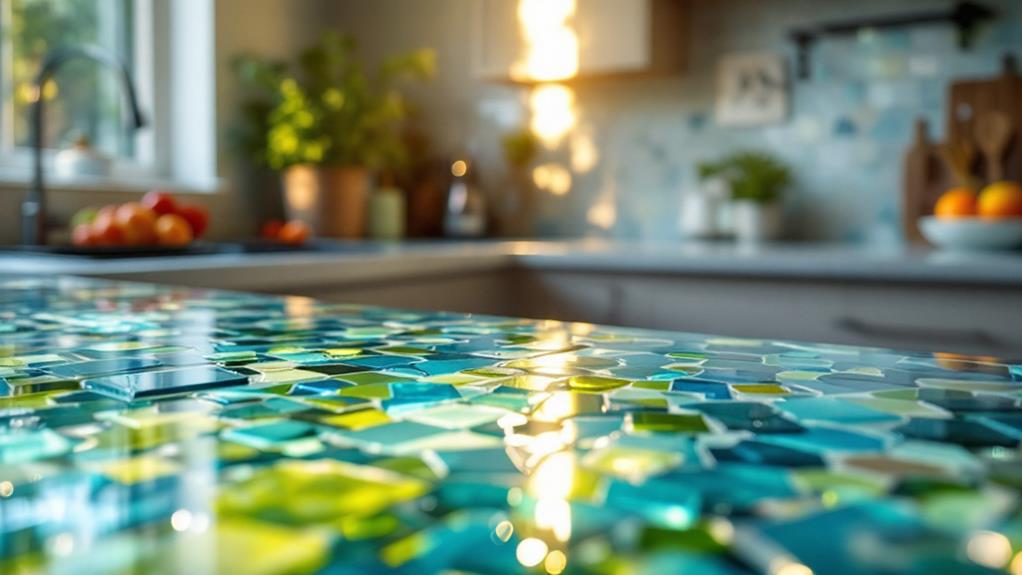
When considering sustainable and stylish options for kitchen renovations, recycled glass countertops stand out for their design versatility. Their vast array of color options and combinations allows homeowners to create personalized designs that can complement any kitchen style, aligning with principles of color psychology to evoke specific moods and feelings.
The unique aesthetic effects achieved by embedding crushed glass result in distinctive appearances that are not easily replicated with other materials, ensuring aesthetic harmony within diverse interior design themes.
Recycled glass countertops allow for:
- Personalized expression: Choose from an extensive palette of colors to reflect your personality and style.
- Unique beauty: Experience the unmatched charm of crushed glass, offering a one-of-a-kind visual appeal.
- Increased brightness: Harness the reflective properties to enhance natural light, bringing vibrancy and depth to your space.
- Customizable creativity: Incorporate elements like concrete or acrylic for a bespoke look and enhanced functionality.
The reflective qualities of recycled glass add a modern touch, contributing to a bright and engaging kitchen environment.
These countertops cater to diverse design preferences, making them a versatile choice for any home renovation project. By selecting recycled glass, homeowners can achieve both eco-friendliness and exceptional design flexibility.
Cost Considerations
Investing in recycled glass countertops offers homeowners both aesthetic appeal and sustainability, though it often comes with a higher initial cost when compared to traditional materials like laminate or granite. Prices typically range from $50 to $150 per square foot, influenced by design complexity and customization choices. However, this investment can be justified through a careful investment analysis, as recycled glass countertops boast durability, resisting scratches and stains. This reduces the need for frequent repairs or replacements, leading to long-term savings.
| Feature | Traditional Materials | Recycled Glass Countertops |
|---|---|---|
| Initial Cost | Lower | Higher ($50-$150/sq ft) |
| Durability | Moderate | High |
| Eco-Friendliness | Low | High |
Furthermore, these countertops can increase property value, appealing to eco-conscious buyers. The sustainable choice is enhanced by local sourcing, potentially reducing transportation costs and supporting green practices. Financing options are available for those interested in spreading the initial expenditure over time, making the shift to eco-friendly living more accessible. Overall, recycled glass countertops represent not just a financial commitment but a step towards a sustainable lifestyle, making them a valuable addition for environmentally aware homeowners.
Installation Process
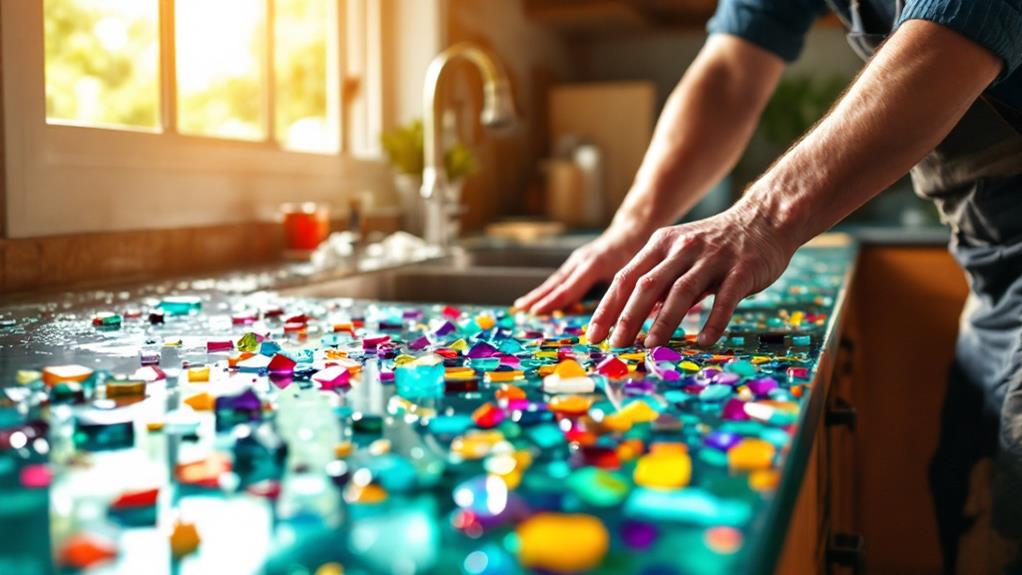
The installation of recycled glass countertops is a meticulous process that benefits from the expertise of professionals, ensuring that the eco-friendly materials are handled with care and precision.
Essential tools and materials, including specialized adhesives and leveling equipment, are required to secure the heavy slabs while minimizing waste through accurate templating.
A step-by-step guide to the installation process highlights the importance of creating a stable base and allowing adequate curing time, ultimately maximizing the countertops' durability and longevity.
Professional Installation Requirements
A significant aspect of guaranteeing the longevity and aesthetic appeal of recycled glass countertops is their professional installation. This process is not without its installation challenges, requiring technician expertise to navigate the intricacies of the material.
Recycled glass countertops are heavy and intricate, necessitating precise measurements and cuts. Skilled technicians are essential to manage these challenges effectively. The installation often involves securing the countertops to the base cabinets with adhesive to guarantee stability and prevent any potential damage.
Custom fabrication may be required for each unique slab, leading to additional time and costs. Proper support structures are important to prevent cracking or damage due to the glass's weight, reinforcing the need for professional guidance.
Furthermore, the use of a specialized sealant is recommended by professional installers to enhance the durability and lifespan of the countertop.
Consider the following:
- Protect the Planet: Opt for sustainable materials that reduce waste.
- Invest in Expertise: Guarantee quality results by hiring skilled technicians.
- Embrace Unique Beauty: Appreciate the distinct patterns of each glass slab.
- Prioritize Durability: Achieve long-lasting surfaces with professional installation.
Tools and Materials Needed
When undertaking the installation of recycled glass countertops, it is crucial to employ the right tools and materials to guarantee both efficiency and sustainability. Key installation techniques require precision, starting with a circular saw equipped with a diamond blade, assuring clean cuts without fracturing the glass. Accurate measurements are critical, making a straight edge indispensable, while a level is essential for proper alignment, preventing future structural issues.
Incorporating a backing board or plywood is recommended to provide additional support, which helps in maintaining the integrity of the countertop over time. The use of a strong adhesive designed specifically for glass surfaces guarantees a durable bond, while silicone caulk seals the edges, safeguarding against moisture penetration.
Tool safety is paramount during installation. Protective gear, including goggles, gloves, and a dust mask, shields against potential hazards like glass shards and dust. A wet saw is a valuable asset for intricate cuts, reducing dust and preventing overheating.
Clamps are necessary to secure the countertop as the adhesive cures, assuring a stable and secure fit. By employing these materials and adhering to safety guidelines, one can achieve a sustainable and lasting installation.
Step-by-Step Guide
To commence the installation of recycled glass countertops, precise planning and execution are essential for an eco-friendly and enduring outcome.
Begin by accurately measuring the countertop area, guaranteeing a seamless fit for the recycled glass slabs, mindful of any sinks or appliances. This step not only enhances countertop aesthetics but also guarantees a flawless integration with your kitchen or bathroom environment.
- Transform your space with sustainable elegance.
- Experience durability with eco-friendly materials.
- Guarantee a perfect fit with accurate measurements.
- Support green living with recycled glass.
Next, prepare the base by confirming that the cabinets are level and stable, as the weight of glass countertops demands a robust support structure.
Use a wet saw equipped with a diamond blade to cut the recycled glass slabs, guaranteeing clean, professional edges. This attention to detail is vital for achieving a polished appearance.
Secure the glass slabs using a recommended adhesive, such as silicone or epoxy, allowing the necessary curing time as per the manufacturer's guidelines.
To finalize the process, seal the seams with clear epoxy resin or silicone to enhance durability and prevent water infiltration, guaranteeing a seamless, long-lasting finish.
These installation tips will not only maximize the lifespan of your countertops but also highlight their sustainable beauty.
Heat Resistance
Recycled glass countertops excel in heat resistance, making them an ideal choice for eco-conscious homeowners seeking both functionality and sustainability in their kitchen design.
These countertops are engineered to manage heat absorption and temperature regulation effectively, allowing them to withstand high temperatures typical in bustling kitchen environments. They can endure direct exposure to heat without significant risk of damage or discoloration, a proof of their robust construction and innovative design.
Testing demonstrates that recycled glass countertops can resist temperatures up to 500°F (260°C) without warping or cracking, offering peace of mind to those who frequently use hot pots and pans.
This exceptional heat resistance not only contributes to the countertop's durability but also guarantees the long-lasting aesthetic appeal that homeowners desire.
Unlike other materials, recycled glass does not release harmful chemicals when subjected to high temperatures, maintaining a safe and healthy cooking environment.
This eco-friendly characteristic underscores their suitability for kitchens where sustainability is paramount.
Color Options
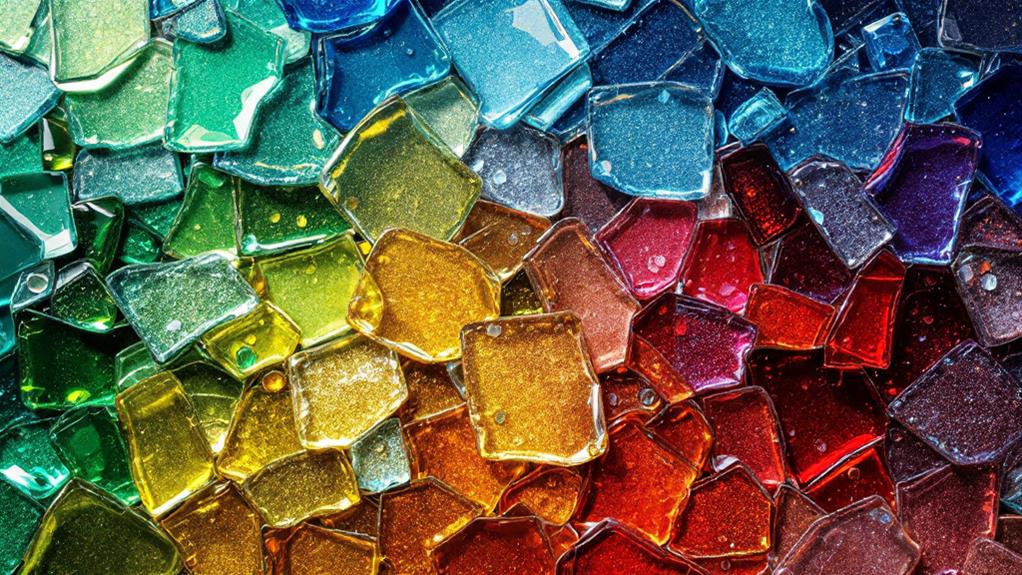
In the domain of recycled glass countertops, the diverse color selection offers an impressive spectrum ranging from vibrant hues to subtle tones, catering to every design preference.
This adaptability is further enhanced by customizable design choices, allowing homeowners to select specific colors and textures that harmonize perfectly with their interior aesthetics.
The eco-friendly nature of these countertops, combined with their ability to create a striking visual impact, makes them an appealing choice for those seeking both sustainability and style in their living spaces.
Diverse Color Selection
When considering eco-friendly options for kitchen design, recycled glass countertops stand out for their diverse color selection, offering nearly limitless combinations to match any aesthetic. The vibrant hues available are not just visually appealing but are also deeply rooted in color psychology, allowing homeowners to tailor their kitchen's ambiance according to modern design trends.
By utilizing post-consumer glass bottles and other recycled materials, these countertops create unique aesthetic effects that are both sustainable and stylish.
The reflective quality of glass enhances the appearance of these colors, bringing spaces to life by interacting beautifully with natural light. This not only makes the kitchen brighter but also adds a sense of openness and freshness.
Additionally, manufacturers draw inspiration from nature, crafting collections that evoke the tranquility and beauty of the natural world.
Consider the following emotional appeals when choosing recycled glass countertops:
- Vibrancy and Warmth: Infuse your kitchen with colors that radiate warmth and positive energy.
- Eco-Conscious Elegance: Embrace a choice that reflects your commitment to sustainability.
- Personal Expression: Choose colors that resonate with your personal style and design vision.
- Natural Inspiration: Connect with nature through color palettes inspired by earth's beauty.
Recycled glass countertops offer an eco-friendly, visually stunning option, perfectly blending sustainability with style.
Customizable Design Choices
Customizable design choices in recycled glass countertops provide homeowners with an unparalleled opportunity to express their unique style through a vast array of color options. The diverse selection available stems from the crushed glass used, sourced from various origins, which offers vibrant hues and distinctive designs. This allows for the creation of unique aesthetics tailored to each individual's preferences, enhancing the overall decor of any kitchen space.
The reflective properties inherent in recycled glass further amplify these color choices, creating stunning visual effects that enhance natural light and contribute to a bright, modern ambiance.
Beyond color, customization in recycled glass countertops extends to incorporating texture combinations. Homeowners can choose to embed materials such as concrete or acrylic into the glass, adding an extra layer of texture and visual interest.
This ability to mix different textures and materials guarantees that each countertop can be a truly bespoke creation, reflecting personal style while also complementing existing home themes. Many manufacturers offer personalized services to create these custom designs, enabling homeowners to achieve a perfect balance between aesthetic appeal and eco-conscious living.
This not only emphasizes sustainable choices but also guarantees a one-of-a-kind kitchen masterpiece.
Comparing Materials
Although traditional countertop materials like granite and laminate have long been popular choices, recycled glass countertops present an eco-friendly alternative that merits consideration.
In material comparisons, recycled glass stands out by being composed of nearly 85% recycled content, considerably reducing landfill waste and conserving natural resources. This positions it as a sustainable choice in countertop preferences.
Unlike granite, which can be porous and requires regular sealing, recycled glass offers a non-porous surface that resists scratches and stains, making it more durable and hygienic for kitchen use.
Consider the benefits of recycled glass countertops:
- Eco-Conscious Choice: Made from 85% recycled glass, reducing landfill waste.
- Durability and Hygiene: Highly resistant to scratches and stains, non-porous, and inhibits bacteria growth.
- Low Maintenance: Easy cleaning compared to granite, which requires sealing.
- Energy Efficient Production: Uses 30% less energy than manufacturing new glass, lowering greenhouse gas emissions.
While the initial investment for recycled glass may be higher than laminate, its long lifespan and durability can lead to considerable long-term savings.
Sustainability Benefits
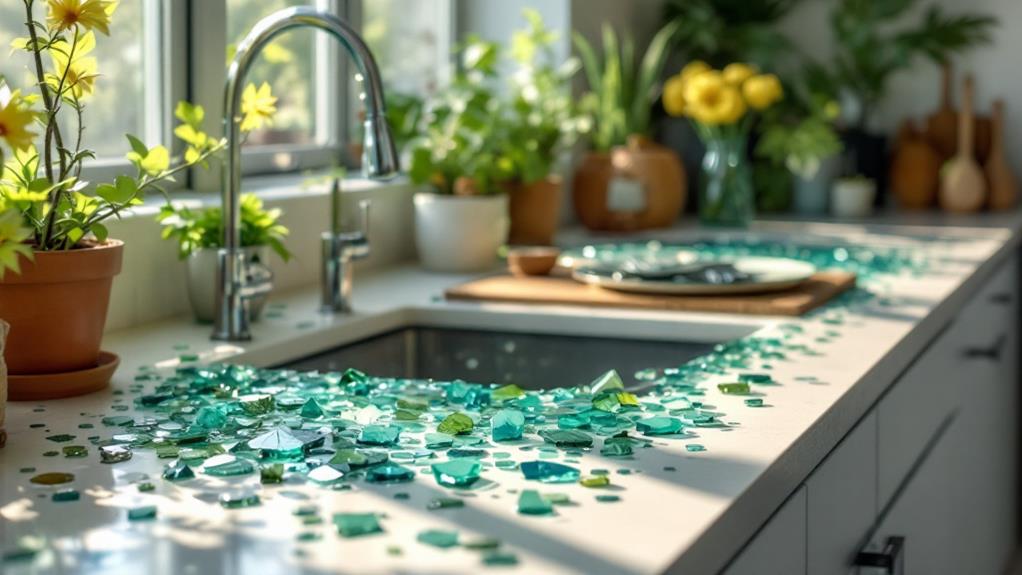
Recycled glass countertops not only provide a durable and low-maintenance alternative to traditional materials but also offer significant sustainability benefits that appeal to environmentally conscious consumers. Made from post-consumer glass, these countertops help reduce landfill waste while conserving natural resources by repurposing existing materials. This eco-friendly innovation is further enhanced by the fact that their production uses approximately 30% less energy than creating new glass, which contributes to a lower carbon footprint.
Moreover, the recycling process of one ton of glass can save over 1,000 pounds of CO2 emissions, aligning with environmental conservation efforts and promoting a circular economy model. Choosing recycled glass countertops supports sustainable manufacturing practices, a factor often recognized by green certifications, hence adding value for eco-conscious homeowners.
| Sustainability Aspect | Benefit |
|---|---|
| Landfill Waste Reduction | Repurposes post-consumer glass, conserving resources |
| Energy Efficiency | Uses 30% less energy, lowering carbon footprint |
| CO2 Emissions Reduction | Saves over 1,000 pounds of CO2 per ton recycled |
These countertops not only provide aesthetic appeal but also resonate with eco-conscious consumer preferences, making them a popular choice in sustainable home renovations. By integrating recycled glass countertops in their homes, consumers actively contribute to a more sustainable and environmentally friendly future.
Potential Drawbacks
Occasionally, the allure of recycled glass countertops is tempered by certain potential drawbacks that merit consideration. While these countertops represent a sustainable choice, their practical challenges may influence decision-making.
Repair challenges are a significant concern; repairing cracks or chips can be intimidating and costly, sometimes necessitating complete replacement if the damage is extensive. This aspect underscores the need for careful handling and regular maintenance to prolong the countertop's life.
Further complicating their appeal is the initial investment, which is often higher than other available materials. For those prioritizing a budget-friendly renovation, this financial aspect could be a deterrent.
Weight limitations also contribute to their fragility; heavy objects must be placed with caution to prevent cracking, which could lead to unexpected expenses over time.
Consider these emotional triggers when evaluating the choice:
- High repair costs: Unexpected financial burdens due to repair challenges.
- Fragility concerns: Anxiety over potential damage from daily use.
- Weight restrictions: Limiting the placement of heavy kitchenware.
- Financial strain: Balancing eco-friendliness with budget constraints.
Despite these factors, recycled glass countertops remain an eco-conscious choice, emphasizing the importance of weighing both environmental benefits and practical considerations.
Consumer Demand
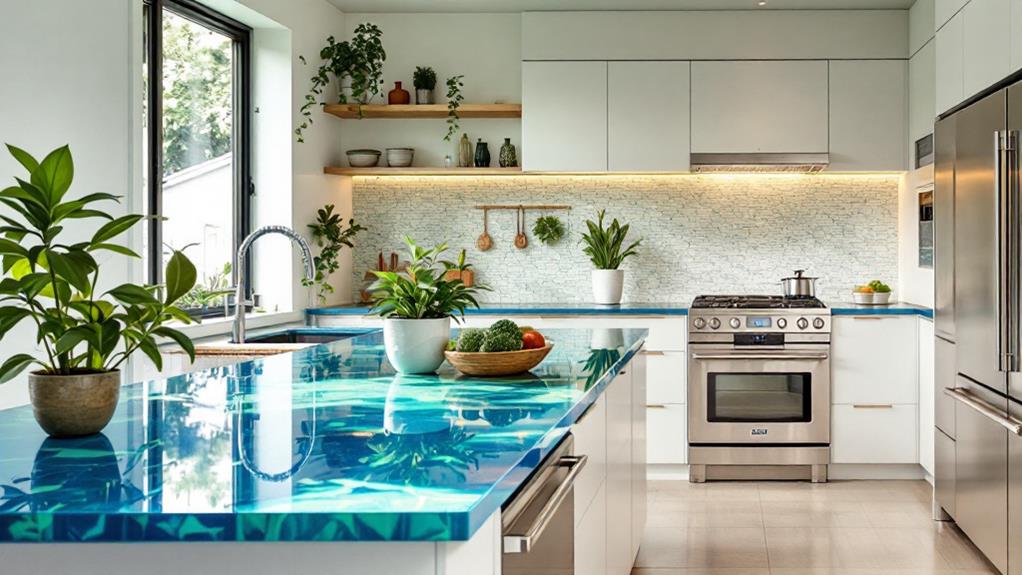
In recent years, the demand for eco-friendly materials has seen a remarkable surge, with recycled glass countertops emerging as a popular choice among environmentally conscious consumers. This shift highlights significant changes in consumer preferences, driven by a heightened awareness of sustainability issues.
Recent surveys indicate that over 60% of homeowners now prioritize sustainable materials in their kitchen renovations, opting for greener alternatives like recycled glass. This preference underscores a substantial market trend towards environmentally friendly home improvement solutions.
The market for recycled glass products is set to expand by over 15% annually, reflecting a strong consumer inclination towards products that harmonize aesthetic appeal with ecological responsibility. Recycled glass countertops, in particular, resonate with eco-conscious buyers due to their role in reducing landfill waste by repurposing glass. This not only aligns with conservation efforts but also caters to consumers seeking products with tangible environmental benefits.
Furthermore, manufacturers are responding to this demand with innovative designs and customizable options, making recycled glass countertops an attractive choice for those looking to blend sustainability with unique home aesthetics.
In this way, consumer interest in these eco-friendly surfaces continues to rise, reinforcing their place in the evolving landscape of market trends.
Future Trends
As the demand for sustainable home improvement solutions continues to gain momentum, the future of recycled glass countertops appears promising and transformative. The market growth for these eco-friendly surfaces is fueled by increasing consumer preference for materials that minimize environmental impact.
With technological advancements in manufacturing, recycled glass countertops are not only becoming more aesthetically pleasing but also more customizable, offering a plethora of colors and textures to suit diverse design preferences.
Key trends in this industry include:
- Energy Efficiency: The production of recycled glass countertops consumes 30% less energy compared to new glass, aligning with the growing focus on energy conservation.
- Enhanced Durability: Technological innovations are improving the durability of these countertops, making them suitable for high-traffic areas.
- Sustainability Certifications: Certifications like NSF and GREENGUARD are gaining importance, encouraging manufacturers to prioritize environmentally friendly standards.
- Increased Consumer Awareness: Rising environmental awareness is driving homeowners to seek out products that offer both aesthetic appeal and ecological benefits.
As these trends continue to evolve, recycled glass countertops are poised to become a cornerstone of sustainable home design, offering a compelling blend of beauty, functionality, and environmental responsibility.
Frequently Asked Questions
Are Recycled Glass Countertops Durable?
Recycled glass countertops exhibit remarkable glass strength, resisting scratches and stains. Their durability is enhanced by proper maintenance tips, ensuring longevity. This eco-friendly choice combines sustainability with resilience, making it an excellent investment for environmentally-conscious consumers.
What Is the Most Environmentally Friendly Countertop?
The most environmentally friendly countertop often balances sustainability benefits and aesthetic appeal. Recycled glass countertops excel with their reduced energy production, waste diversion, and vibrant designs, making them a preferred choice for eco-conscious consumers seeking sustainable elegance.
Are Recycled Glass Countertops Expensive?
Recycled glass countertops generally have a higher cost compared to traditional options like laminate or granite. However, their unique aesthetic and eco-friendly appeal, coupled with professional installation, offer long-term value, making them a worthwhile investment.
What Are Recycled Countertops Made Of?
Recycled countertops primarily consist of post-consumer glass combined with resins, offering sustainability benefits by reducing landfill waste and energy use. They provide diverse design options through customizable aesthetics, utilizing additional materials like concrete or acrylic for unique, eco-friendly surfaces.
Conclusion
Recycled glass countertops present a compelling choice for environmentally conscious consumers, offering a blend of durability, aesthetic versatility, and sustainable benefits. By utilizing post-consumer and industrial glass, these countertops greatly reduce waste and resource consumption. While maintenance requirements are minimal, potential drawbacks include higher costs compared to traditional materials. However, the increasing consumer demand and emerging trends in sustainable design suggest a promising future for recycled glass as a preferred material in eco-friendly home construction and renovation.
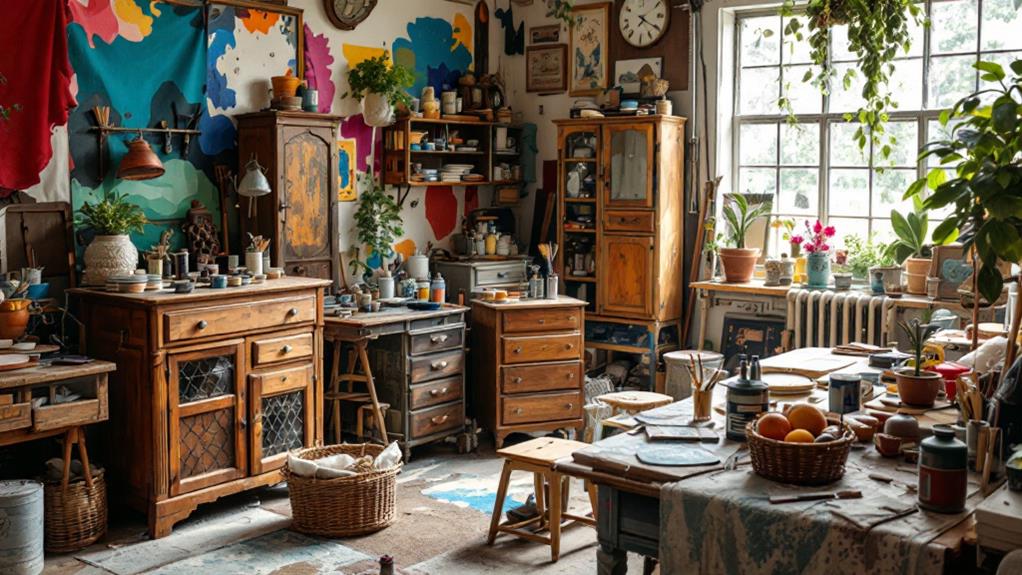


Leave a Reply